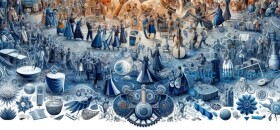The Cultural Undead
Words: 671 Pages: 2 7528In an attempt to delve into the pervasive influence that zombies wield over contemporary society, it is crucial to explore their origins and the underlying fears they symbolize. Initially emerging from Haitian folklore as reanimated corpses, the concept of zombies has metamorphosed into a significant cultural phenomenon through the medium of film and literature. The portrayal of zombies as 'monsters'—a term that can be understood as the embodiment of fear—reflects societal anxieties. Consequently, zombies, alongside other creatures like vampires and […]



